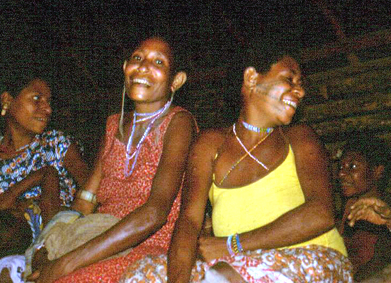
The concept of human sexuality is a sensitive and critical subject area while learning the cultural practices of a given society both present and past. It is sensitive because, many societies will place emphasis on individual privacy for the human body. It is important because, for many societies, sex (and sexuality) stretches beyond procreation; by the same token, without procreation there would be no society. As it stands today “…per government statute, sexual relations between persons of the same sex…is officially illegal in Papua New Guinea,” the area in which the Gebusi have settlements (89). This rule dictates what sexual behaviors are to be permitted. It is generally accepted that “…a person’s sexual orientation…sexual identity—may not be consistent with each and every instance of his or her actual sexual behavior,” with the idea that ‘sexual orientation’ and ‘sexual identity’ hold mutually exclusive definitions (90).
“Though Gebusi men might have been considered ‘bisexual’ in an overall sense, their orientations ultimately wreak havoc with Western categories such as ‘homosexual,’ ‘heterosexual,’ or even ‘bisexual,’” (87).
Much of the Gebusi culture has changed since the 1980s. A significant amount of ‘horseplay’ among young Gebusi men “is what could be called, ‘homosexual’ rather than ‘heterosexual,’” prior to those changes in the late nineteen-hundreds (80). This was discovered at a time in Gebusi history when the Gebusi were being observed by anthropologists who collected information about their cultural practices and beliefs. The practice of initiation into manhood corresponds to a somewhat hedonistic ritual whereby the “teenager manipulates the phallus of his elder counterpart and orally consumes the semen,” which was believed to contain a life force (81). The belief in spirits correspond to their practice of séances to obtain guidance from the spirits on important matters such as sorcery accusations which, if convicted, carried the penalty of death. With practices and beliefs placed together in context, it is difficult to definitively claim that homosexual behaviors were consistently pleasure seeking in nature.
“Hence it is no contradiction for Gebusi that their spirit séances arouse both sexual desire and the possibilities of homicidal revenge against sorcery suspects,” (87).
The idea of hedonism could be analyzed by examining a range of behaviors. For instance, among early adolescence for Gebusi males, most of the horseplay or “sexual joking, some of it quite physical, flirts with possibilities that aren’t consummated,” however some behaviors are (80). A couple years before the turn of the century, anthropologists observed young men tryst1 with each other. Married men however “did not tryst with each other,” because to do so, as a married person, would be considered taboo (81). Another example demonstrating the range of behaviors, is that men “never indulged in public nudity or open sexuality,” homosexual tendencies were often cloaked in séances, horseplay, or male initiation rituals (83).
While the initiation ritual had the literal act of ingesting semen, it was believed to “supply the uninitiated bachelor male life force for his masculine development,” which was a rite of passage, or honoring event for an adolescent who was coming of age (81). A tradition so sacred that taking it a way was punishment. Indeed, “[d]enying initiation is a severe sanction for young men,” waiting to be recognized as grown men (84). The initiation process is called “wa kawala,” which literally means “boy become big,” in the Gebusi language (82). Although young Gebusi men or “initiates-to-be found sexual release with each other,” secretly and on occasion, the prevailing public policy leans toward heterosexual romance and couples (82).
“In social reality, as well as in male fantasy Gebusi men are enticed by women’s sexuality,” (85).
A final consideration about male initiation is with regards to publicly disgracing oneself. The punishment for young men in disgrace would have likely prevented their initiation. This act of disgrace might include, engaging in sexual acts with a married woman. Initiation is essentially a spiritual experience for the adolescent male and their elder; therefore, to have release prior to this event saturates the spiritual experience. Boys are “discouraged or prohibited from themselves having sexual release prior to initiation,” according to academics on this subject (83). The folklore shared around campfires, incorporates stories of a man and a woman who are strangers to one another, yet forced to reside together for some reason. The man is seen as a hero for refraining from sexual acts with the woman. The Gebusi men, braggadocios around the campfire, regale at the fictitious tale and about their libido for women.
